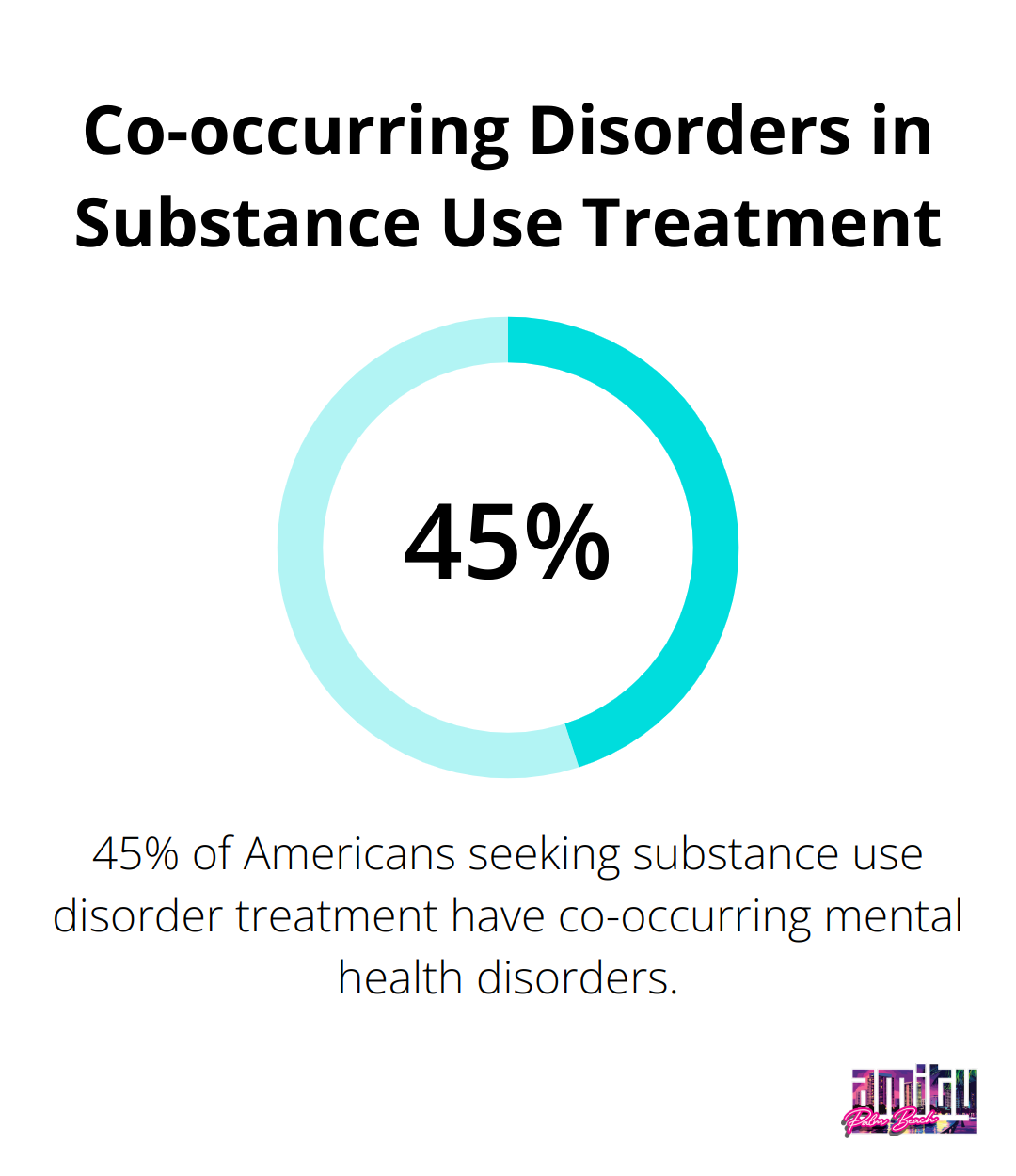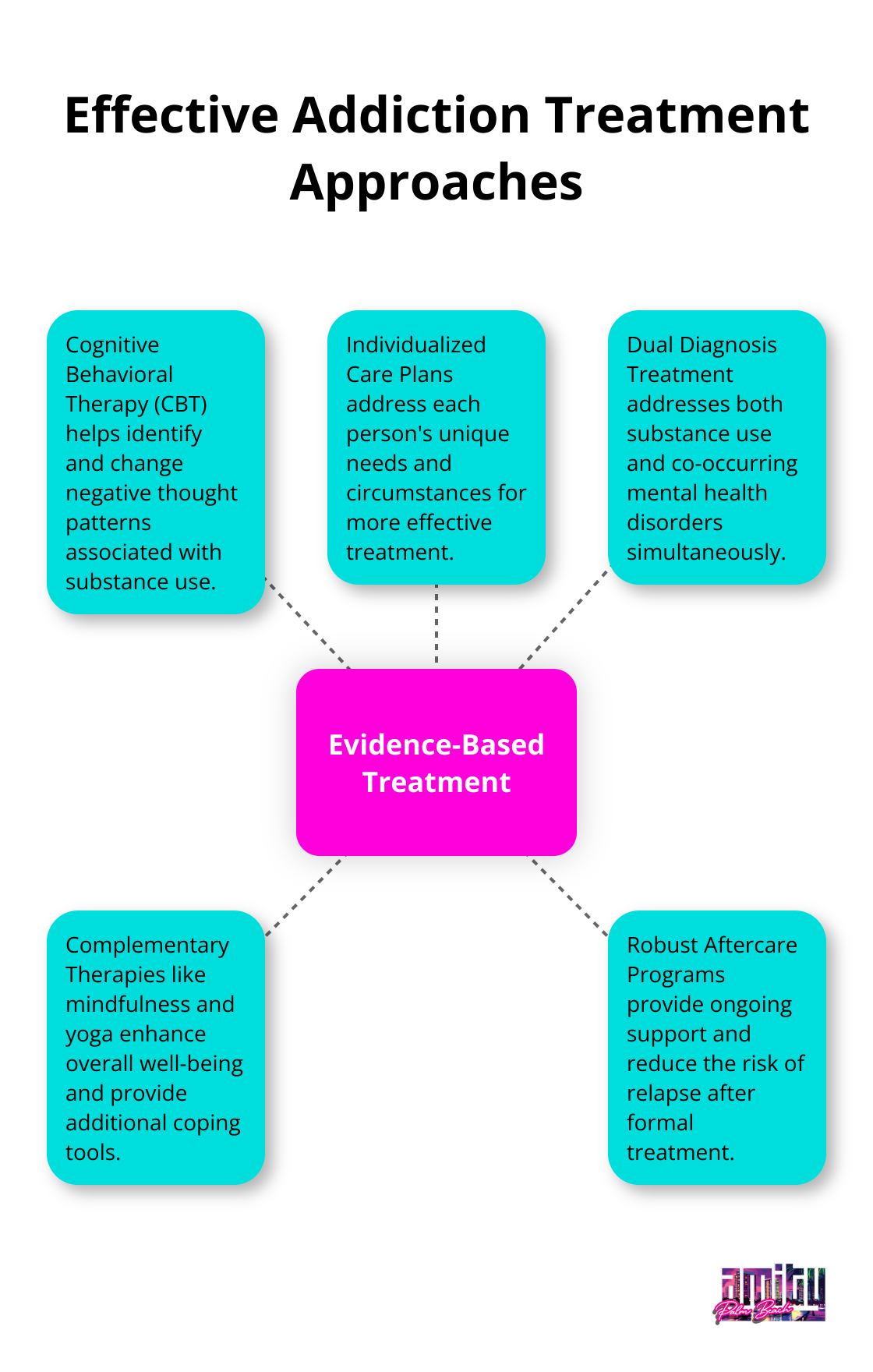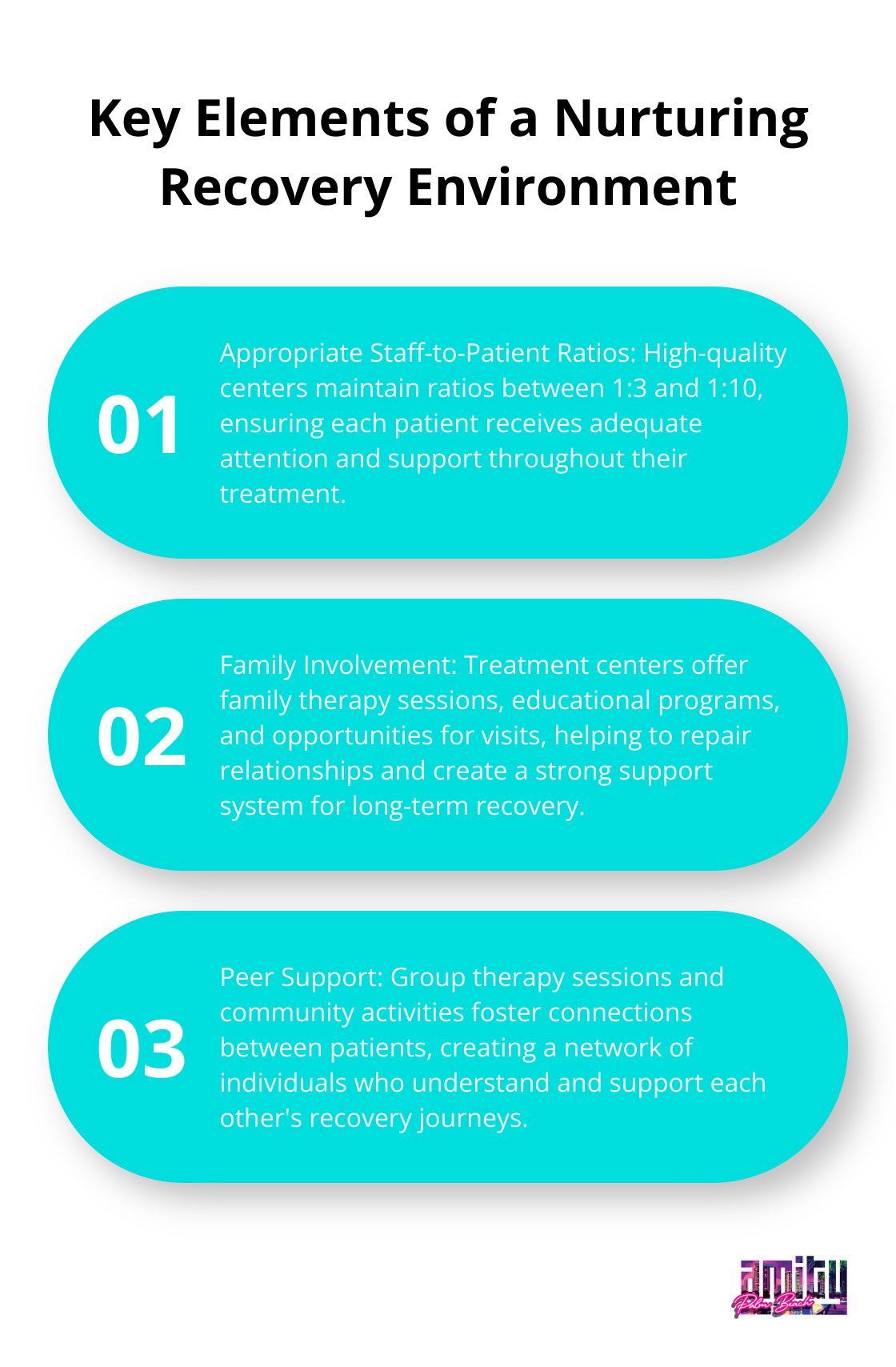Choosing the right addiction treatment center is a critical step on the path to recovery. At Amity Palm Beach, we understand the importance of finding a facility that aligns with your unique needs and goals.
Treatment centers vary widely in their approaches, expertise, and amenities. This guide will help you navigate the selection process, ensuring you make an informed decision for yourself or your loved one.
What Matters Most in Addiction Treatment Centers?
Credentials and Expertise
The selection of an addiction treatment center can shape your recovery journey. At Amity Palm Beach, we recognize the impact the right facility has on successful outcomes. When you evaluate potential centers, prioritize those with proper accreditation and licensing. The Joint Commission and CARF (Commission on Accreditation of Rehabilitation Facilities) stand out as respected accrediting bodies. These certifications ensure facilities meet stringent standards of care and safety.
The expertise of staff holds equal importance. Search for centers that boast a multidisciplinary team of board-certified addiction specialists, psychiatrists, therapists, and nurses. The National Institute on Drug Abuse highlights that the quality of interaction between patients and their treatment providers strongly predicts positive outcomes.
Treatment Approaches and Programs
Recovery paths differ for each individual. This fact underscores the need to find a center that offers various evidence-based treatment programs. Look for facilities that provide a continuum of care (from medically supervised detox to residential treatment and outpatient services).
Centers should offer individualized treatment plans that address not only addiction but also co-occurring mental health disorders. The Substance Abuse and Mental Health Services Administration (SAMHSA) reports that about 45% of Americans seeking substance use disorder treatment have received diagnoses of co-occurring mental and substance use disorders.

Measuring Success and Outcomes
While recovery extends throughout life, treatment centers should provide data on their success rates and patient outcomes. Ask about their methods for tracking progress and maintaining long-term sobriety. Centers that conduct follow-ups with patients after discharge and offer robust aftercare programs often see better long-term results.
Location and Environment
The setting of a treatment center can significantly influence the recovery process. Some individuals benefit from a change of scenery and distance from triggers, while others prefer proximity to their support network. Consider which environment will best support your recovery goals.
Facility amenities can also contribute to the healing process. While luxury isn’t necessary for effective treatment, a comfortable, clean, and safe environment allows you to focus on your recovery without added stress or distractions.
Personalized Care and Support
The most critical factor in choosing a treatment center involves finding one that aligns with your specific needs and goals. Take time to research, ask questions, and visit facilities if possible. Your commitment to finding the right fit marks the first step towards a successful recovery journey.
As you continue your search for the ideal treatment center, consider how each facility approaches individualized care and support. This aspect of treatment often proves instrumental in achieving lasting recovery.
What Makes an Effective Treatment Approach?
At Amity Palm Beach, we believe that effective addiction treatment transcends a one-size-fits-all approach. Our experience shows that successful recovery depends on a combination of evidence-based practices, personalized care, and comprehensive support.
The Power of Evidence-Based Practices
Evidence-based practices form the cornerstone of effective addiction treatment. These therapies and interventions have scientific proof of positive outcomes. Cognitive Behavioral Therapy (CBT), for instance, has shown remarkable success in helping individuals identify and change negative thought patterns associated with substance use.
The National Institute on Drug Abuse reports that CBT, when combined with other evidence-based approaches, can significantly reduce relapse rates. We incorporate these proven methods into our treatment programs, ensuring that our clients receive the most effective care possible.

Tailoring Treatment to Individual Needs
No two individuals experience addiction in the same way, which is why personalized treatment plans are essential. A study published in the Journal of Substance Abuse Treatment found that patients who received individualized care were 43% more likely to complete their treatment program and maintain sobriety.
When you evaluate treatment centers, look for those that conduct thorough assessments and create customized plans. These should address not only substance use but also any co-occurring mental health disorders (a practice known as dual diagnosis treatment).
Beyond Traditional Therapy
While evidence-based practices form the foundation of treatment, many individuals benefit from complementary therapies. Holistic approaches like mindfulness meditation, yoga, and art therapy can enhance overall well-being and provide additional tools for managing stress and cravings.
A 2019 study in the Journal of Psychoactive Drugs found that participants who engaged in mindfulness practices alongside traditional treatment reported a 31% reduction in substance use compared to those who received only standard care.
The Critical Role of Aftercare
Recovery doesn’t end when formal treatment concludes. Aftercare programs play a vital role in maintaining long-term sobriety. Aftercare reduces relapse risk by providing essential support, bridging the gap between treatment and daily life.
Try to find treatment centers that offer robust aftercare options, including alumni programs, continued therapy sessions, and connections to local support groups. These resources provide a safety net as you navigate the challenges of early recovery and beyond.
Evaluating Treatment Center Effectiveness
When choosing a treatment center, it’s important to consider how they measure and report their success rates. Ask about their methods for tracking patient progress and maintaining long-term sobriety. Centers that conduct follow-ups with patients after discharge (and offer robust aftercare programs) often see better long-term results.
Look for centers that provide transparent data on their outcomes. This might include statistics on completion rates, sobriety maintenance, and improvements in overall quality of life. While every individual’s journey is unique, these metrics can give you a sense of the center’s effectiveness.
As you continue your search for the ideal treatment center, consider how each facility approaches individualized care and support. The next section will explore the importance of a supportive environment in the recovery process, including factors like staff-to-patient ratios and group therapy involvement.
Creating a Nurturing Recovery Environment
At Amity Palm Beach, we understand the vital role environment plays in the recovery process. A supportive setting can transform a person’s journey to sobriety. Let’s explore the key elements that contribute to a nurturing recovery environment.
Staff-to-Patient Ratios Matter
An appropriate staff-to-patient ratio ensures optimal care. High-quality residential treatment centers typically feature a staff-to-client ratio between 1:3 and 1:10. This allows each patient to receive adequate attention and support throughout their treatment.
High-quality treatment centers employ a diverse team of professionals (therapists, counselors, medical staff, and support personnel). This multidisciplinary approach allows for comprehensive care tailored to each individual’s needs.

Family Involvement Strengthens Recovery
Family support significantly improves treatment outcomes. Family involvement can have a substantial impact on the recovery process and treatment outcomes for individuals struggling with substance abuse.
Treatment centers should offer family therapy sessions, educational programs for loved ones, and opportunities for family visits. These programs help repair relationships, educate family members about addiction, and create a strong support system for long-term recovery.
Peer Support Builds Community
Peer support is a powerful tool in addiction recovery. Group therapy sessions and community activities foster connections between patients, creating a network of individuals who understand and support each other’s journeys.
Research from the Substance Abuse and Mental Health Services Administration shows that peer support services can reduce hospitalization rates and improve overall treatment outcomes. Ask about a center’s approach to community building and peer support programs when evaluating options.
Comfort and Safety Promote Focus
A comfortable and safe environment allows patients to focus fully on their recovery without external stressors. This includes clean, well-maintained facilities, private or semi-private rooms, and spaces for relaxation and reflection.
Safety is paramount in addiction treatment. The facility you choose should have proper security measures in place (including 24/7 staff supervision and protocols for handling emergencies).
Nutrition and Wellness Fuel Recovery
Proper nutrition and wellness programs play a significant role in recovery. Substance abuse can lead to nutritional deficiencies, and addressing these issues can improve overall health and support the recovery process.
Try to find treatment centers that offer nutritious meal plans, nutrition education, and wellness activities (such as fitness classes, yoga, or meditation). These programs contribute to physical healing and provide valuable tools for managing stress and maintaining overall well-being in recovery.
Final Thoughts
Selecting the right addiction treatment center requires careful consideration of several key factors. Accreditation, staff expertise, and evidence-based practices form the foundation of quality treatment. Individualized care plans, dual diagnosis capabilities, and a range of therapy options ensure comprehensive support for each person’s unique needs.
The environment of a treatment center plays a significant role in the recovery process. A supportive atmosphere with appropriate staff-to-patient ratios, family involvement, and peer support can greatly enhance the healing journey. Comfortable facilities, safety measures, and wellness programs further contribute to a nurturing recovery setting.
If you or a loved one struggles with addiction, seeking professional help is a sign of strength. Amity Palm Beach offers comprehensive, individualized care in a supportive environment. Our team of experts will guide you through every step of your recovery journey, from initial assessment to long-term aftercare.




